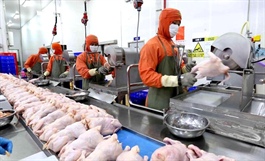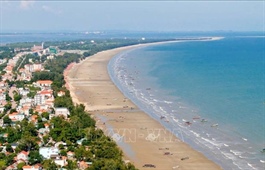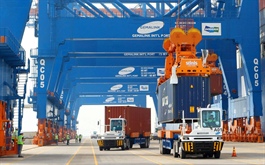VN must ramp up production of feed raw materials
VN must ramp up production of feed raw materials
Increasing domestic supply of raw materials is among the highest priorities for the development of Viet Nam's livestock feed industry in the future, said policymakers and industry experts.

In recent decades, the overreliance on imported raw materials has been identified as a major shortcoming of the industry. The country's fast-expanding livestock sector has a huge demand for feed, one that domestic producers could only meet just over 40 per cent.
The Southeast Asian country imported 22.3 million tonnes of raw materials, with a large part made up of corn and soybean oil, worth of US$10 billion in 2021 alone.
Increasing domestic supply, however, will likely prove to be a tall order, which requires solid groundwork and meticulous plans from both the Government and producers.
Vo Quang Nhan, head of the marketing department at Woosung Viet Nam JSC., a large producer in southern Viet Nam with an extended distribution network in the Mekong Delta, said the industry has been struggling with rising prices and on-and-off supply of raw materials as a result of disruption in the global market.
In the last few years, Woosung has been working around the clock to find domestic suppliers among the country's many agricultural hubs as a way to compensate and lessen the reliance on imported raw materials.
However, Nhan said a key priority for major feed makers was a stable supply of standardised input, which remains a challenging task for small-and-medium-sized suppliers to pull off.
Similarly, CP Viet Nam, the country's leading livestock supplier, said they have been in talks with over 300 domestic suppliers across the country. A CP Viet Nam spokesperson said the country views domestic suppliers as a key component of and the cornerstone for a sustainable supply chain.
In a recent meeting with the local authority of southern Dong Nai Province, Dutch feed maker De Heus said the corporation considered the development of Vietnamese suppliers a must-do to ensure a sustainable supply chain.
Industry experts have long voiced concerns over the industry's overreliance on imported materials, which renders it particularly vulnerable to market shocks.
Dr Che Minh Tung from HCM City University of Agriculture and Forestry said feed alone could account for up to 80 per cent of livestock costs yet the country has not been able to produce many key components that made up its animal feed portfolio.
In order to reduce reliance on imported raw materials and develop a sustainable supply chain, the country must start planning, with significant support from the Government, for production centres. Measures must also be taken to boost investment, both from domestic and international businesses, in the industry.




















